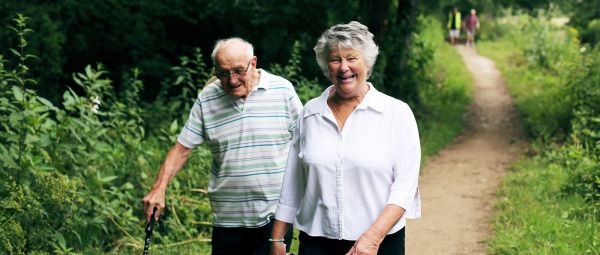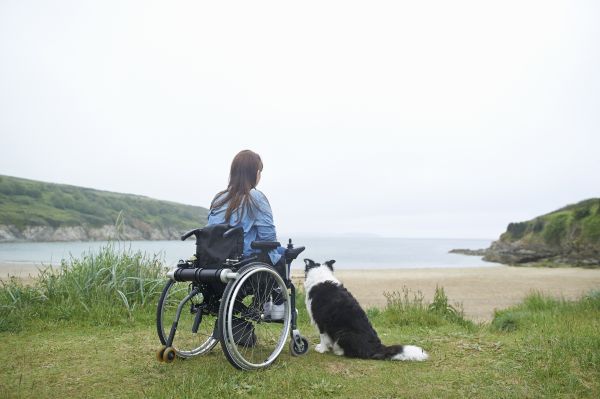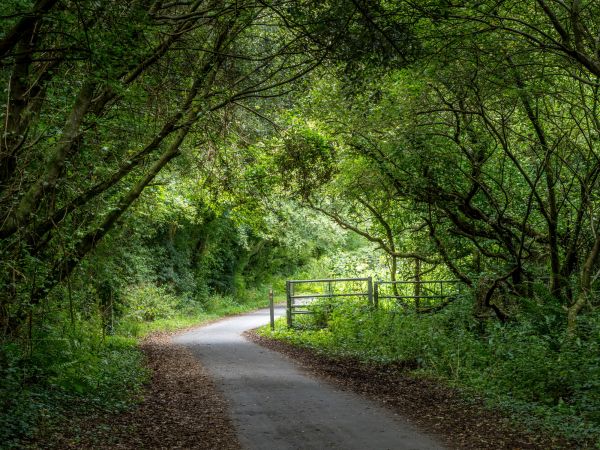Paralympian David Weir backs Ramblers call for inclusive paths
The Ramblers calls for the removal of barriers so that more people can access the outdoors

5 April 2024
The Ramblers is calling on the UK government to remove all unnecessary barriers within the next five years. Shining a spotlight on the path barriers faced by those with disabilities or limited mobility, our goal is to see improvements to the path network to make access to nature more inclusive for all.
Evidence of the issue
In a recent survey conducted by YouGov for the Ramblers, 25% of people say physical barriers (such as stiles, steps, or gates) stop them from using the path network. This figure rises to 56% of people with physical and sensory disabilities. The research suggests that physical barriers pose a significant reason why people with disabilities are not able to fully use our paths network.
The benefits of being out in nature are huge and improve both our mental and physical health, including decreased risk of cardiovascular disease, anxiety and depression. However, despite 87% of respondents in this group agreeing that the path network is a national asset, and 92% stating it should be protected for future generations, more than half of people with physical or sensory disabilities surveyed said they did not feel welcome when using public rights of way.
A call for change
This must change so that those who are excluded, or who could become less mobile due to changing circumstances particularly in later life, can benefit from easy access to nature. Estimates suggest that over 20% of England’s population are currently unable to make full use of public rights of way because of mobility issues, meaning approximately 11 million people are missing out.
David Weir CBE, eight-time London Marathon winner and six-time Paralympic gold medallist, is backing the call for change which, he says, could make a significant difference to the wellbeing of those with disabilities:
“The issues the Ramblers are highlighting are very important and personal to me. Having the ability to access nature on my doorstep makes a big difference to my mental wellbeing, as well as providing some active recovery when I’m not training. Through experiencing what accessibility is like in different countries across the world, I can say that the UK is one of the strongest. However, it’s clear that we still have a way to go, especially in aspects such as making our path network more accessible and useable for those with disabilities. If more people are able to get outside and get active in nature, the knock-on effect for our physical and mental health will be huge.”
Watch our video where our head of paths, Jack Cornish, speaks to David about his experiences with accessibility on paths: https://youtu.be/BuMB9L9rjLA

A wide-reaching issue
Wheelchair users and people with physical disabilities are not the only path users affected by these barriers. Those with poor mobility, the elderly, people with push chairs and even dog walkers with less athletic pets can struggle on poorly designed paths. In addition to stiles, steps or gates, physical barriers include paths that are blocked or not well maintained. One person with mobility issues reported to the Ramblers that “paths are not maintained in winter, so it is easy to fall over” highlighting how accessibility varies at different times of year.
Subtle barriers such as the nature of the path surface, lack of public toilet facilities and lack of seating, can impact many different people including those with health conditions and those with disabilities. These issues can be a problem before people even start a walk, with another person telling the Ramblers there's “no easy way to find out if paths are wheelchair accessible or not beforehand”.
Unlocking the outdoors
With a Westminster election due to be called by the end of 2024, the Ramblers has launched their Outdoors Unlocked campaign, calling on the next UK government to break down the barriers currently standing in the way. The campaign calls for new legislation that will help deliver on the current UK government’s pledge to make sure everyone can access green space within a 15-minute walk. The Ramblers’ proposals will bring access to nature closer to home, unleash the power of the path and access network, and build a future plan that ensures long term focus and momentum.
Jack Cornish, Head of Paths for the Ramblers says:
“We are committed to improving access to the outdoors for everyone in society, and to making our path network inclusive, safe, and useable; ensuring that everybody in England, no matter who they are or what their circumstances, can get outdoors and connect with nature as part of their daily lives. But we can’t do this alone. The UK government needs to support this vital and cherished part of our infrastructure by strengthening equalities legislation to reduce obstructions for disabled people and supporting local authorities to invest more time and money to make our paths more accessible. Getting the detail right will be critical in unleashing the potential of our path network, creating more opportunities for people to connect with nature and putting in place long-term strategy to support public access for future generations.”
In the meantime, the Ramblers are working to bring paths closer to home for more people. The charity has helped ensure walkers have access to vast swathes of countryside and made sure the right laws are in place to keep it that way. The Ramblers’ Path Accessibility Fund was specifically set up to make paths more accessible and is enabling whole stretches of paths to be improved with projects completed, or underway, in Aberystwyth, Essex, Oldham, Gwynedd, Hampshire and Worcestershire. The Ramblers also runs hands-on programmes, such as path maintenance, with teams of Ramblers volunteers giving up their time daily to make sure our paths remain open, clear, and well maintained for everyone to enjoy.

Disability and public access
Spending time outdoors in nature should be easy, accessible and enjoyable for all. But our paths, tracks and trails are not always accessible to everyone.

How to identify accessible walks
Use the tips in our short practical guide to help you find walks suitable for people with limited mobility.

10 great routes for wheelchair users
Absorb history, wildlife and a sense of freedom whilst exploring these well-surfaced wheelchair-friendly trails.